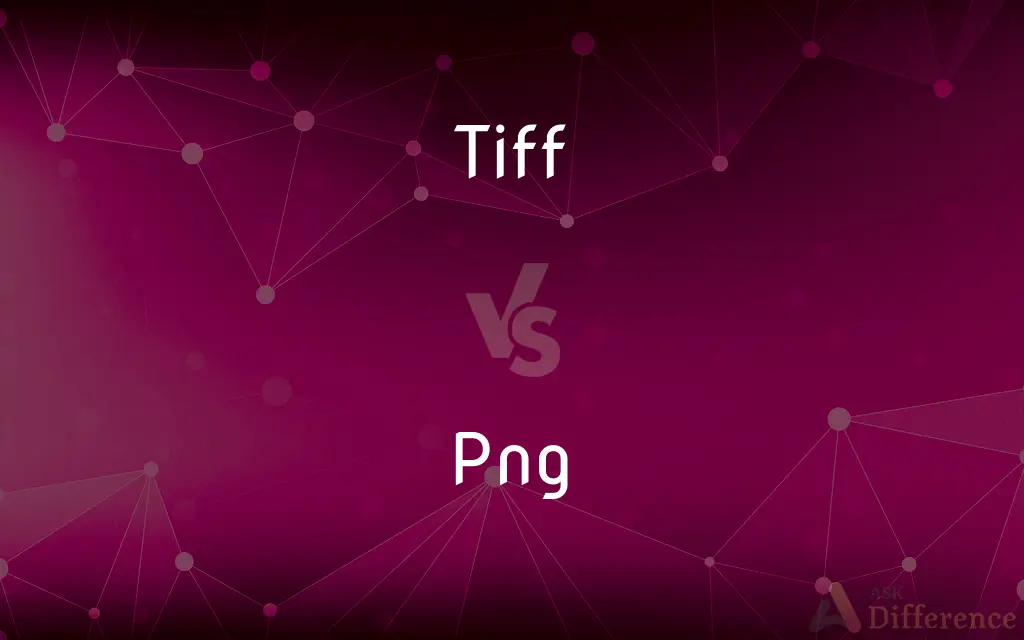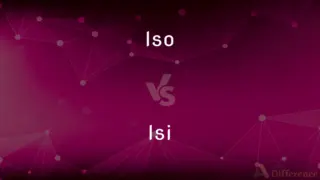TIFF vs. PNG — What's the Difference?
By Tayyaba Rehman — Published on October 3, 2023
TIFF (Tagged Image File Format) is a high-quality, lossless file format ideal for print, while PNG (Portable Network Graphics) is a lossless compression format designed for web use.

Difference Between TIFF and PNG
Table of Contents
ADVERTISEMENT
Key Differences
TIFF and PNG are both image file formats, but they serve different purposes and have unique characteristics. TIFF, which stands for Tagged Image File Format, is often favored by professionals in the photography and design industries due to its high quality and lack of compression artifacts. In contrast, PNG, short for Portable Network Graphics, is popular for web graphics because it supports transparency and has a smaller file size suitable for online use.
The origin of TIFF dates back to the mid-1980s when it was introduced as a format for desktop publishing and graphic art applications. Its flexibility allows it to store images with a large bit depth, making it a preferred choice for archival purposes. PNG, on the other hand, emerged in the mid-1990s as a response to the limitations of the GIF format, offering improved compression techniques without the loss of image quality.
A significant difference between TIFF and PNG lies in their use cases. TIFF files tend to be larger and are usually chosen when preserving image details is crucial, such as in professional photography or scanning old photos. PNGs are often used for web graphics, logos, icons, and screenshots because of their ability to handle transparency and offer a good compression rate without diminishing visual quality.
Lastly, when selecting between TIFF and PNG, one should consider the software compatibility and the intended use of the image. While TIFF might be preferable for high-resolution printing, PNG might be the go-to choice for web applications or when transparency is a necessity.
Comparison Chart
Origins
Introduced in the mid-1980s for desktop publishing.
Developed in the mid-1990s as an alternative to GIF.
ADVERTISEMENT
Compression
Lossless compression, leading to larger file sizes.
Lossless compression optimized for smaller file sizes.
Usage
Preferred for high-quality prints and archival purposes.
Commonly used for web graphics, icons, and logos.
Transparency
Does not inherently support transparency.
Supports transparency, making it ideal for web use.
File Extension
.tiff or .tif
.png
Compare with Definitions
Tiff
TIFF is known for its lossless compression.
Designers use TIFF to preserve the intricate details of their artwork.
Png
PNG was developed as an alternative to GIF.
PNG became popular because of its advanced features compared to GIF.
Tiff
TIFF files typically have larger sizes.
Due to its larger size, Joe had to wait longer to download the TIFF file.
Png
PNG provides a good balance of quality and file size.
For her blog, Karen used PNG images to ensure fast loading times without compromising quality.
Tiff
TIFF is a high-resolution image file format.
For printing her photos, Jane prefers using TIFF due to its quality.
Png
PNG files can display transparent backgrounds.
The logo looked seamless on the website, thanks to its PNG format.
Tiff
A fit of irritation.
Png
PNG is a popular image format for web use.
Websites use PNGs for their logos because they support transparency.
Tiff
A petty quarrel.
Png
PNG stands for Portable Network Graphics.
When choosing a format, Tim went with PNG due to its lossless compression.
Tiff
To quarrel.
Png
(computing) nodot=1; Portable Network Graphics, an open protocol for digital images.
Tiff
A small argument; a petty quarrel.
Tiff
Liquor; especially, a small draught of liquor.
Tiff
(intransitive) To quarrel.
Tiff
To deck out; to dress.
Tiff
Liquor; especially, a small draught of liquor.
Tiff
A fit of anger or peevishness; a slight altercation or contention. See Tift.
Tiff
To be in a pet.
She tiffed with Tim, she ran from Ralph.
Tiff
To deck out; to dress.
Tiff
A quarrel about petty points
Tiff
TIFF stands for Tagged Image File Format.
TIFF formats are extensively used in professional photography.
Tiff
TIFF offers extensive bit depth and flexibility.
For her archival project, Lisa used TIFF to retain image integrity.
Common Curiosities
What does TIFF stand for?
TIFF stands for Tagged Image File Format.
How does PNG differ from JPEG?
PNG is lossless and supports transparency, while JPEG is lossy and doesn't support transparency.
Why are TIFF files larger in size?
TIFF files are larger because they use lossless compression, retaining more image details.
Why is PNG popular on the web?
PNG is favored for web use due to its transparency support and good compression rates.
Do all image viewers support TIFF?
Not all. TIFF might require specific software or plugins, especially for multi-layered TIFFs.
Can TIFF handle layers like in Photoshop?
Yes, TIFF can store multi-layered images, making it a choice for saving work-in-progress edits.
Why might one choose PNG over GIF?
PNG offers better compression and color support without the limitations of GIF's 256 colors.
Is there a loss in quality when compressing as PNG?
No, PNG uses lossless compression, retaining image quality.
Can I use PNG for printing?
Yes, but TIFF or other high-resolution formats might be better for professional print jobs.
Which format is better for archiving photographs: TIFF or PNG?
TIFF is usually chosen for archival purposes due to its extensive bit depth and flexibility.
Is TIFF better than JPEG for photography?
TIFF is lossless, making it preferable for preserving image quality, while JPEG uses lossy compression.
Can PNG images be animated like GIFs?
No, standard PNGs can't be animated; however, there's an extended version called APNG that supports animation.
Does PNG support high bit-depth images?
Standard PNG supports up to 8 bits per channel, but there's an extension, PNG-16, that supports 16 bits per channel.
Are TIFF images suitable for web use?
Due to their larger sizes, TIFF images are not optimal for web use. PNG or JPEG is often preferred.
Which format is more universally accepted: TIFF or PNG?
PNG is more universally accepted, especially on the web and in general applications.
Share Your Discovery

Previous Comparison
ISO vs. ISI
Next Comparison
Dedication vs. EnthusiasmAuthor Spotlight
Written by
Tayyaba RehmanTayyaba Rehman is a distinguished writer, currently serving as a primary contributor to askdifference.com. As a researcher in semantics and etymology, Tayyaba's passion for the complexity of languages and their distinctions has found a perfect home on the platform. Tayyaba delves into the intricacies of language, distinguishing between commonly confused words and phrases, thereby providing clarity for readers worldwide.














































